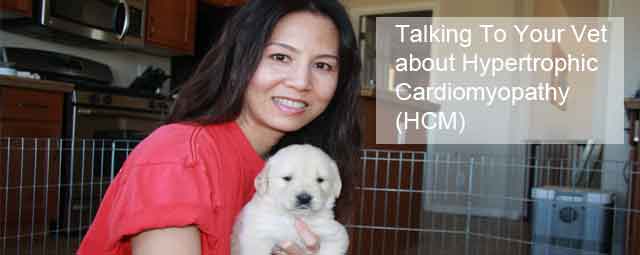Talking To Your Vet about Hypertrophic Cardiomyopathy (HCM)
What Is HCM?
This is a disease associated with the heart muscle. When afflicted with HCM, the heart muscle thickens and reduces the efficiency of the heart’s pumping ability. As the heart muscle thickens, less blood fills the chamber, so less blood leaves to nourish the body. The cause of HCM has not been determined, but some cats are more prone to it than others, with middle-aged males being the most commonly affected. HCM is not the only disease to cause thickening of the heart muscle; hyperthyroidism and systemic hypertension are also culprits. If your vet suspects HCM, blood pressure and a thyroid panel should be done to rule these diseases out.
Signs and Symptoms of HCM
Early on, some pets have no signs of being ill. Occasionally, the left lung may become congested. Some signs of the disease may include:
- Lethargy
- Decreased activity level
- Labored breathing
- Open-mouth breathing
Sometimes, pets with HCM will experience congestive heart failure on the right and left sides, and the extra buildup of fluids within the abdominal cavity will make breathing very difficult. Once this happens it is considered clinical heart failure, and treatment needs to be aggressive. Some signs of heart failure include:
- Acute weakness
- Collapsing
- Sudden death
- Paralysis
- What to Expect

Once your veterinarian begins testing, your cat will likely go through rigorous testing so the vet can determine where exactly the problem lies. He will perform a physical exam, which may reveal some scary things. Try to remain calm and hear what he has to say. Some problems may include:
- Heart murmur
- Abnormal heart sounds
- Abnormal lung sounds
- Irregular heart rhythm
He may even perform chest X-rays and an EKG to further examine the effects of the thickening heart muscle. Depending on what he finds, you will probably have to follow up every six months to a year. It’s important to stay on top of the disease and treat it however is necessary.
Even pets that show no symptoms of the disease may need regular evaluations to track the progress of HCM. Sometimes, cats will need medications to slow the heart rate or to help relax heart ventricles. Most treatments are tailored to each patient depending on how the disease is affecting them. Some common medications for HCM include:
- Beta-adrenergic blockers
- Tenormin
- Inderal
- Calcium-channel blockers
- Cardizem CD
- Dilacor XR
- Diuretics
- Furosemide
- Spironolactone
- Aspirin
- Warfarin
- Heparin






